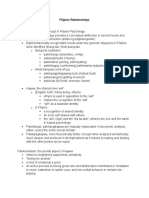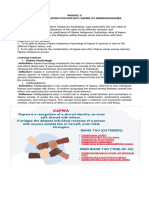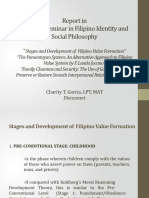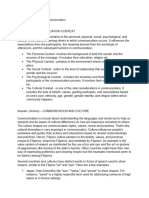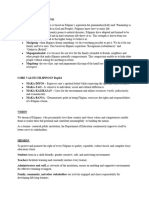REVIEWER-The Importance of Pakikipagkapwa PDF
REVIEWER-The Importance of Pakikipagkapwa PDF
Uploaded by
MG8 Dominique MagkalasCopyright:
Available Formats
REVIEWER-The Importance of Pakikipagkapwa PDF
REVIEWER-The Importance of Pakikipagkapwa PDF
Uploaded by
MG8 Dominique MagkalasOriginal Title
Copyright
Available Formats
Share this document
Did you find this document useful?
Is this content inappropriate?
Copyright:
Available Formats
REVIEWER-The Importance of Pakikipagkapwa PDF
REVIEWER-The Importance of Pakikipagkapwa PDF
Uploaded by
MG8 Dominique MagkalasCopyright:
Available Formats
The Importance of Pakikipagkapwa
Kapwa
• Pivotal (most important) Filipino value.
• shared identity and interconnectedness of individuals.
• acknowledges the self in relation to others.
The Filipino Concept of Pakikipagkapwa
• "Pakikipagkapwa" is a Filipino term that conveys the concept of interconnectedness and
the idea of treating others as equals, recognizing and valuing the shared humanity and
dignity of all individuals. It emphasizes the importance of harmonious relationships,
empathy, and a sense of community with others.
Chracteristics of Pakikipagkapwa
• Shows interconnectedness (may pagkakaugnay-ugnay)
• Has strong conviction (may paninindigan)
• Emphasizes valuing of character (may pagpapahalaga sa pag-uugali)
• Show importance on respecting every person as an equal member of the community. (may
paggalang at pagkakapantay-pantay)
Eight Levels of Pakikipagkapwa (Enriquez, 1976)
Highest Level
Pakikiisa (Being One With)
Pakikisangkot (Getting Involved)
Pakikipagpalagayan/Pakikipagpalagayang-loob
(Being in Rapport/Understanding/Acceptance with)
Pakikisama (Being Along With)
Pakikibagay (In-Conformity/In-Accord with)
Pakikilahok (Joining/Participating with)
Pakikisalamuha (Interaction with)
Pakikitungo (Transaction/Civility with)
Lowest level
Pakikitungo (Transaction/Civility with)
This is the basic level of interaction where individuals engage with each other with civility and
politeness.
Example: Greeting a colleague with a smile and saying "good morning" in the workplace.
Pakikisalamuha (Interaction with)
At this level, people engage in more meaningful interactions with one another, going beyond
basic civility.
Example: Striking up a conversation with a fellow parent at a school event and discussing
shared interests.
Pakikilahok (Joining/Participating with)
This involves actively participating and engaging with others in various activities and social
settings.
Example: Joining a local sports team and participating in regular practices and games.
Pakikibagay (In-Conformity/In-Accord with)
Adapting and adjusting to align with the norms, values, and behaviors of a particular group or
culture.
Example: Observing and following cultural customs and traditions when visiting a foreign
country.
Pakikisama (Being Along With)
At this level, individuals willingly cooperate and socialize with others, fostering a sense of
camaraderie.
Example: Participating in community events and celebrations, working together for the
common good.
Pakikipagpalagayan/Pakikipagpalagayang-loob (Being in Rapport/Understanding/Acceptance
with)
This level involves a deeper sense of mutual acceptance, trust, and rapport between
individuals.
Example: Forming a close-knit group of friends who share their joys and sorrows and fully trust
each other.
Pakikisangkot (Getting Involved)
This is about becoming more deeply involved and engaged with others, often in a collaborative
or supportive manner.
Example: Volunteering for a community project, actively contributing time and effort to achieve
a common goal.
Pakikiisa (Being One With)
At the highest level, individuals experience a profound sense of unity, solidarity, and shared
identity with a group or community.
Example: Members of a religious or spiritual community who share the same beliefs and
values, forming a deep sense of oneness and purpose.
Manifestation of Pakikipagkapwa in other Filipino Values
Bayanihan is a Filipino concept where people coming together to help each other, especially in
times of need. It's like a community or teamwork spirit where everyone pitches in to achieve a
common goal or support one another.
The Filipino Hospitality often called "malasakit," refers to the warm and welcoming nature of
Filipinos when they host or interact with guests. It involves being generous, friendly, and
making visitors feel comfortable and appreciated.
Family centeredness often known as "pagkaka-pamilya," means that family is at the heart of
Filipino culture. It's about valuing and prioritizing family relationships, being close-knit, and
providing strong support and care for family members.
Cooperation or “pagtutulungan” is the willingness to work together and collaborate with others
for mutual benefit.
Compassion or “kahabagan” is the act of demonstrating empathy, understanding, and
kindness towards others, especially those who are in need or experiencing suffering.
You might also like
- Filipino Relationships KapwaDocument31 pagesFilipino Relationships Kapwakerr villanuevaNo ratings yet
- UNIT 3 - Filipinization of Personality TheoryDocument4 pagesUNIT 3 - Filipinization of Personality TheorySheal Tiel100% (2)
- Econometrics Modulei-3Document87 pagesEconometrics Modulei-3Tajudin Abba Ragoo88% (17)
- Heywood Global Politics Chapter 01-21 SlidesDocument136 pagesHeywood Global Politics Chapter 01-21 SlidesBo100% (3)
- Business EthicsDocument9 pagesBusiness Ethicschrizadelacruz3No ratings yet
- Philippines Values: Strengths To Filipino CharactersDocument5 pagesPhilippines Values: Strengths To Filipino CharactersPigging EtchuzeraNo ratings yet
- GMRC Act 1Document5 pagesGMRC Act 1Gian GuiananNo ratings yet
- Community Health Nursing Chapter 8Document6 pagesCommunity Health Nursing Chapter 8Audrie Allyson GabalesNo ratings yet
- Filipino Values - DissDocument21 pagesFilipino Values - Dissroyalecloc.01No ratings yet
- Ethics Topic Filipino ValuesDocument2 pagesEthics Topic Filipino ValuesJerome BelarminoNo ratings yet
- Topic 7Document36 pagesTopic 7MayNo ratings yet
- The Filipino Self and The KapwaDocument3 pagesThe Filipino Self and The KapwaJohn Bryan Languido100% (1)
- Team BuildingDocument6 pagesTeam BuildingMARY IRISH FAITH PATAJONo ratings yet
- Filipino Moral Behaviors ReportDocument20 pagesFilipino Moral Behaviors Reporttere madriagaNo ratings yet
- Human Fellowship Non Violence Education 217 1Document18 pagesHuman Fellowship Non Violence Education 217 1Pamela ManglicmotNo ratings yet
- Chapter 10 Filipino Characteristics 1Document12 pagesChapter 10 Filipino Characteristics 1Kyla BalboaNo ratings yet
- Sharing and CaringDocument2 pagesSharing and Caringayoub.salhi.as7No ratings yet
- Assignment 8Document10 pagesAssignment 8torrenaaliyahNo ratings yet
- Module 9 PicDocument3 pagesModule 9 PicwinstonkennedycabanitNo ratings yet
- ACTIVITY 2 Module 2 Good CitizenshipDocument6 pagesACTIVITY 2 Module 2 Good CitizenshipdextherorleanssNo ratings yet
- SOCIETY, CULTURE With FAMILY PLANNINGDocument112 pagesSOCIETY, CULTURE With FAMILY PLANNINGAngelica VallejoNo ratings yet
- Social Sustainability and PakikipagkapwaDocument8 pagesSocial Sustainability and PakikipagkapwaAaron Christian LegaspiNo ratings yet
- V. The Filipinization of Personality TheoryDocument28 pagesV. The Filipinization of Personality TheorylfhippocampusNo ratings yet
- Virtue Ethics (SM)Document17 pagesVirtue Ethics (SM)lunairepark18No ratings yet
- Pantayong PananawDocument28 pagesPantayong Pananawrayvenmalacad7No ratings yet
- I, You and We: Respecting Similarities and DifferencesDocument15 pagesI, You and We: Respecting Similarities and DifferencesKenneth AranteNo ratings yet
- KapwanitikanDocument11 pagesKapwanitikanma.marites caliwagNo ratings yet
- Cultural Roots of Resilience - Cut To 20 Mins (2) July 16Document28 pagesCultural Roots of Resilience - Cut To 20 Mins (2) July 16NCH FundsNo ratings yet
- Ethics Report Filipino WaysDocument22 pagesEthics Report Filipino WaysFrank AbagnaleNo ratings yet
- 3Document4 pages3cifaheb214No ratings yet
- Artikel Yeni OctavianiDocument8 pagesArtikel Yeni OctavianiJumi PermatasyariNo ratings yet
- Lecture 1Document1 pageLecture 1KING ARTHUR RAGAYDAYNo ratings yet
- Activity No. 4 Intercultural Education. MarquezDocument2 pagesActivity No. 4 Intercultural Education. MarquezFrancesca Ameliá100% (2)
- Values FocusDocument3 pagesValues FocusMyyo TabunoNo ratings yet
- Local and GlobalDocument3 pagesLocal and GlobalTuffer KhrisNo ratings yet
- Larry - Character FormationDocument2 pagesLarry - Character FormationKhristel AlcaydeNo ratings yet
- Summary of UCSP For 3rd Quarter Exam OnlyDocument6 pagesSummary of UCSP For 3rd Quarter Exam OnlyraffakeshiNo ratings yet
- NSTP 1 Filipino Values in The CommunityDocument1 pageNSTP 1 Filipino Values in The Communityakatsukikojo30No ratings yet
- Inbound 7995271132473332035Document1 pageInbound 7995271132473332035Shiela GloriaNo ratings yet
- Lesson2 1Document23 pagesLesson2 1mother.slayer.5000No ratings yet
- 8f98e365870e A Filipino Citizen (Respect)Document18 pages8f98e365870e A Filipino Citizen (Respect)Dhan CabugaoNo ratings yet
- Individualism Vs ColectivismDocument1 pageIndividualism Vs ColectivismAndrei PetrescuNo ratings yet
- CultureDocument5 pagesCultureferlitaNo ratings yet
- The Polital SelfDocument11 pagesThe Polital SelfAngela Joy LeysaNo ratings yet
- Local Media584668351069579013Document2 pagesLocal Media584668351069579013Khycelee June P. BASEANo ratings yet
- SSE 701 ReportDocument12 pagesSSE 701 ReportCharity TirazonaNo ratings yet
- KAPWA Core Values at Pantayong PananawDocument9 pagesKAPWA Core Values at Pantayong PananawAnna Liza LimNo ratings yet
- Filipino Core ValuesDocument5 pagesFilipino Core ValuesLiezel-jheng Apostol Lozada100% (2)
- Introduction To Government Business EthicsDocument26 pagesIntroduction To Government Business EthicsayessaNo ratings yet
- Reflection Paper-Blackfoot Values: Aatsimoyihkaan (Prayer)Document13 pagesReflection Paper-Blackfoot Values: Aatsimoyihkaan (Prayer)api-359979131No ratings yet
- Module 13Document11 pagesModule 13camille nina jane navarroNo ratings yet
- FSSE 102 Activity 1Document1 pageFSSE 102 Activity 1Jenny PeraltaNo ratings yet
- Strengths and Weaknesses of Filipino Character: (Kalakasan at Kahinaan NG Katangian NG Mga Filipino)Document15 pagesStrengths and Weaknesses of Filipino Character: (Kalakasan at Kahinaan NG Katangian NG Mga Filipino)Janry AlbanciaNo ratings yet
- Asynchronous Act. WK.2Document2 pagesAsynchronous Act. WK.2EricaNo ratings yet
- UHV&PE Unit3Document18 pagesUHV&PE Unit3Google GoogleNo ratings yet
- Anzia Abigail Issues For Disccourse Oct 16Document4 pagesAnzia Abigail Issues For Disccourse Oct 16Abigail AnziaNo ratings yet
- Multicultural CommunicationDocument3 pagesMulticultural CommunicationfatimaryzabakilNo ratings yet
- Reflection PaperDocument4 pagesReflection Paperleslie.reyes.casswNo ratings yet
- Values EdDocument3 pagesValues EdabaoalanNo ratings yet
- Lesson 9 GuideDocument2 pagesLesson 9 GuidePinky MangueraNo ratings yet
- Effective Communication Through the Gift of ListeningFrom EverandEffective Communication Through the Gift of ListeningNo ratings yet
- Stewart, J., Gapenne, O. y Di Paolo, E. (Eds.) - Enaction. Toward A New Paradigm For Cognitive ScienceDocument483 pagesStewart, J., Gapenne, O. y Di Paolo, E. (Eds.) - Enaction. Toward A New Paradigm For Cognitive ScienceAle LuNo ratings yet
- A Conceptual Model of Multiple Dimensions of IdentityDocument9 pagesA Conceptual Model of Multiple Dimensions of IdentityMakpal AkishovaNo ratings yet
- Ab Sociology ProspectusDocument2 pagesAb Sociology ProspectusGuinevere BaroqueNo ratings yet
- Structure Vs Unstructured ApproachDocument13 pagesStructure Vs Unstructured ApproachSaba HamzaNo ratings yet
- Asian J of Social Psycho - 2002 - Pe Pua - Sikolohiyang Pilipino Filipino Psychology A Legacy of Virgilio G EnriquezDocument23 pagesAsian J of Social Psycho - 2002 - Pe Pua - Sikolohiyang Pilipino Filipino Psychology A Legacy of Virgilio G EnriquezKuya WhaleNo ratings yet
- Abraham Maslow BibliographyDocument4 pagesAbraham Maslow BibliographyHarry TorresNo ratings yet
- 10 1017@sjp 2013 79Document10 pages10 1017@sjp 2013 79bordian georgeNo ratings yet
- صناعة المكان الصحيDocument21 pagesصناعة المكان الصحيMNo ratings yet
- Chapter 1 Phrasal VerbsDocument6 pagesChapter 1 Phrasal VerbsAnna ManukyanNo ratings yet
- 10 SST QP Set 2Document8 pages10 SST QP Set 2Vedant DuaNo ratings yet
- A Study On Employees Motivation and Its Impact On Employees PerformanceDocument69 pagesA Study On Employees Motivation and Its Impact On Employees PerformanceAjita SinghNo ratings yet
- Bias and Noise: Daniel Kahneman On Errors in Decision-MakingDocument10 pagesBias and Noise: Daniel Kahneman On Errors in Decision-MakingMaya AudinaNo ratings yet
- Existential TherapyDocument63 pagesExistential TherapyAarti MNo ratings yet
- Social Movements in Chile (1983-2013) - Four Theoretical and Historical MomentsDocument15 pagesSocial Movements in Chile (1983-2013) - Four Theoretical and Historical MomentsSeba StiánNo ratings yet
- How To Ace Job InterviewDocument21 pagesHow To Ace Job InterviewASHLEA JANE VILBARNo ratings yet
- Alvima Environmental and Social Impact Assessment Revised FinalDocument99 pagesAlvima Environmental and Social Impact Assessment Revised FinalBright MelbaNo ratings yet
- Unit Plan Shainy Soco GNMDocument2 pagesUnit Plan Shainy Soco GNMyogi nathNo ratings yet
- Territorial Identity and Sustainable Dev PDFDocument19 pagesTerritorial Identity and Sustainable Dev PDFSvjetlana VišnićNo ratings yet
- Social ScienceDocument8 pagesSocial ScienceHappiest StatusNo ratings yet
- Towards A New Epistemology of The UrbanDocument33 pagesTowards A New Epistemology of The UrbanСемён «dead reborn» АртасовNo ratings yet
- Lecture Notes in Ssci 4 (Socio-Anthropology) : Lesson 1Document5 pagesLecture Notes in Ssci 4 (Socio-Anthropology) : Lesson 1Deanne Mitzi SomolloNo ratings yet
- The Path of Standard Albanian Language Formation: Sindorela Doli KryeziuDocument10 pagesThe Path of Standard Albanian Language Formation: Sindorela Doli Kryeziunguyen minh ducNo ratings yet
- Error Log For The Official Guide OG 2022, GmatclubDocument139 pagesError Log For The Official Guide OG 2022, GmatclubHargovind NainaniNo ratings yet
- Experiencing Violence in The Philippine Political-Groen Kennisnet 557334Document120 pagesExperiencing Violence in The Philippine Political-Groen Kennisnet 557334s2023100074No ratings yet
- PatkmresearchappmasterDocument31 pagesPatkmresearchappmasterResty kamyaNo ratings yet
- Mister Don't Touch The BananaDocument23 pagesMister Don't Touch The BananaΔημήτρης ΑγουρίδαςNo ratings yet
